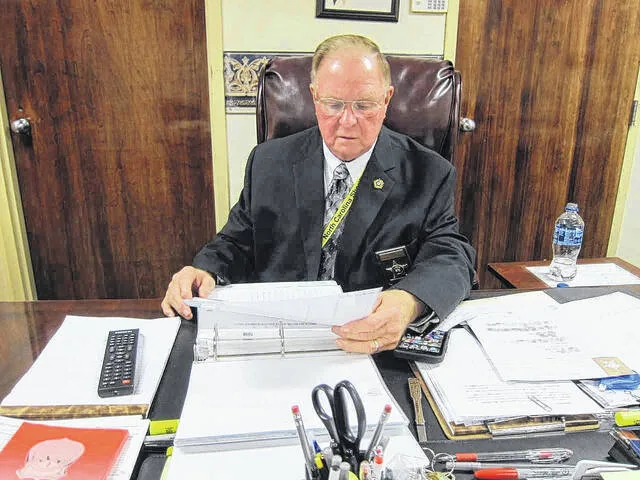
Robeson County History
The Dec. 3, 1923 (100 years ago) Robesonian reported that local churches contributed $4,390 for the Thomasville Orphanage. “Thanksgiving Day was generally observed in Lumberton, as usual. Business was suspended on Sunday, quiet prevailed. Services were held at the First Baptist, Presbyterian and Gospel Tabernacle churches and collections were taken for orphanages.
The Dec. 6, 1973 (50 years ago) Robesonian reported on newly elected members of the Pembroke Town Council, stating the following: The own council had its firszt meeting under the administration … Mayor Juddie Revelsw, succeeding former mayor Earlie B. Maynor, presided. He and the new commissions took the oath of office Monday night administered by Ben Floyd Jr., clerk of Robeson Superior Court.
On Dec. 2, 1918 (five years ago) The Robesonian ran a story about outgoing Robeson County Sheriff Kenneth Sealey and newly elected mayor Burnis Wilkins. “A distinguished career in law enforcement that spanned six decades in Robeson County came to an end Friday when Sheriff Kenneth Sealey officially retired. ‘Even as a young child, I wanted to be in law enforcement,’” Sealey said. Talking about his plans for the office, Wilkins said “I will implement community policing and despite what people say it really does work. We’re going back to the old school where the community knows their deputy by name, getting out and talking to farmers and people at the community store.”
North Carolina History
On Dec. 2, 1903, the trustees of Trinity College—the predecessor institution of Duke University—voted not to accept the resignation of history professor John Spencer Bassett, opting instead to issue a strong statement on the necessity of free speech.
Bassett attempted to resign from Trinity because of a controversy that stemmed from an article he wrote for the October 1903 issue of the South Atlantic Quarterly. In its pages Bassett, Tarboro-born and nationally heralded as a scholar, praised Booker T. Washington as “all in all the greatest man, save General Lee, born in the South in a hundred years.”
Such praise for a black man was unusual and, in the poisonous racial atmosphere of the times, led to calls for Bassett’s resignation. Josephus Daniels of the News and Observer led the attack. Neither the praise for Robert E. Lee nor the fact that Trinity was a private institution, made any difference to Bassett’s critics. The episode, now commonly referred to as the Bassett Affair, remains a landmark in the history of academic freedom.
Dec. 4, 1865: For a state to be readmitted to the Union following the Civil War, President Andrew Johnson required states to approve the amendment. Ten days following North Carolina’s vote the requisite three-quarters of the states had approved its ratification and thus it became law.
This action by the legislature in 1865 actually came almost three years after the Emancipation Proclamation, which outlawed slavery in the southern states. Following the passage of the Thirteenth Amendment, the Freedmen’s Convention met a few blocks northwest of the N.C. State Capitol. That assembly was the first effort by the state’s African Americans to press for full political rights.
On December 5, 1962, a U.S. district court dismissed a suit against two Greensboro hospitals challenging “separate but equal” treatment in private, non-profit hospitals. The case was ultimately overturned on appeal.
The suit, now known as Simkins v. Cone, was brought by African American medical professionals and their patients against the Moses H. Cone Memorial and Wesley Long Community Hospitals. Their objective was to gain admission privileges for themselves and their patients.
Since the U.S. Supreme Court declined to review the case, it was only legally binding in Maryland, Virginia, West Virginia and the Carolinas, but the ruling helped turn the tide toward hospital desegregation across the South. It was the first time a federal court prohibited racial discrimination by a private entity.
Nation and World History
On Dec. 2, 2000, Al Gore sought a recount in South Florida, while George W. Bush flatly asserted, “I’m soon to be the president” and met with GOP congressional leaders.
On. Dec. 3, 1992, the first telephone text message was sent by British engineer Neil Papworth, who transmitted the greeting “Merry Christmas” from his work computer in Newbury, Berkshire, to Vodafone executive Richard Jarvis’ mobile phone.
On Dec. 4, 1956, Elvis Presley, Johnny Cash, Jerry Lee Lewis and Carl Perkins gathered for the first and only time for a jam session at Sun Records in Memphis.
On Dec. 5, 2022, Moscow unleashed a massive missile barrage in Ukraine, striking homes and buildings and killing civilians just hours after the Kremlin claimed Ukrainian drones struck two air bases deep inside Russian territory.
On Dec. 6, 1865, the 13th Amendment to the U.S. Constitution, abolishing slavery, was ratified as Georgia became the 27th state to endorse it.
On Dec. 7, 1941, the Empire of Japan launched an air raid on the U.S. Navy base at Pearl Harbor in Hawaii as well as targets in Malaya, Hong Kong, Guam, the Philippines and Wake Island; the United States declared war against Japan the next day.
On Dec. 8 1980, rock star and former Beatle John Lennon was shot to death outside his New York City apartment building by Mark David Chapman.
The History column is compiled by David Kennard, executive editor of The Robesonian, from Robesonian archives, NC Dept. of Natural and Cultural Resources and the Associated Press.

